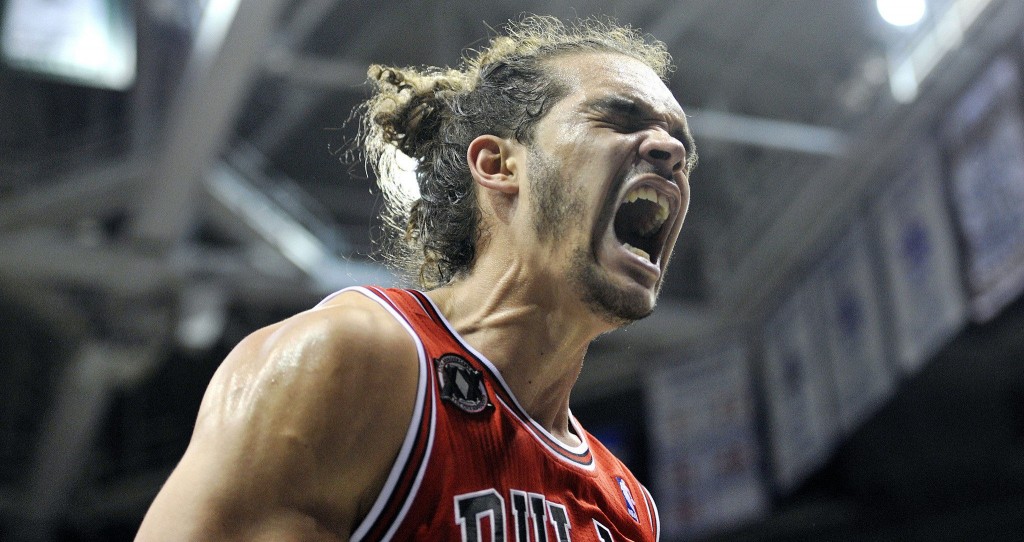Culture
Ups and Downs: On Gay Athletes in the NBA

For basketball fans in Chicago, the Midwest, or anywhere outside of South Beach, FL, Sunday was a disappointing night. The Bulls lost their second consecutive game Eastern Conference Finals to the Miami Heat, the NBA’s equivalent of the Cobra Kai dojo, letting a close contest become a blowout in the fourth quarter for the second game in a row. And perhaps nothing better crystallized the frustration felt by the team than a brief exchange between Bulls center Joakim Noah and a Miami fan, in which an exacerbated Noah was caught by cameras calling the fan a “fucking fa**ot.”. This comes not too far on the heels of a similar incident between Lakers’ star Kobe Bryant, who shouted the same term at an NBA referee in frustration on April 13th.
Bryant apologized, was fined $100,000, and participated in an NBA-sponsored public service announcement promoting diversity. Noah, similarly, apologized and was fined $50,000 (with his fine being smaller likely because he apologized immediately, and berated a fan, not a referee, which is a more common — and therefore more harshly punished — occurrence in the league.)
I’ll come back to the fines and the stereotypical reaction from NBA fans in a moment, but I think it’s worth pointing out that the incidents with Bryant and Noah, that combined would last no longer than 10 seconds, have ramifications beyond the individual moments, and belie the reality that the NBA and professional sports as a whole are stuck in a contentious transition between two identities. On May 16th, within a month of what both Bryant and Noah said, Phoenix Suns President Rick Welts announced to The New York Times that he was gay, saying that: “This is one of the last industries where the subject is off limits […] Nobody’s comfortable in engaging in a conversation.” Meanwhile, in the NHL, New York Rangers winger Sean Avery appeared in a public service announcement supporting marriage equality:
The confluence of all these isn’t as coincidental as it might seem; rather, I think it’s an indication of the fact that American professional sporting is caught between a progressive identity on sexual orientation, and an outdated culture of silence and intimidation. To be clear, I don’t think that either Kobe Bryant or Joakim Noah (who is a notoriously emotional, excitable player) are homophobic individuals; they both said that they were caught up in a moment of frustration, and used the term without meaning anything derogatory about the GLBT community, and I tend to believe them. The issue, though, is that the implied insult of the term “fa**ot” is directly related to the kind of negative stereotypes attributed to gay men — that they are weak, un-masculine or effeminate.*
And for every response like that of former NBA player and current TV analyst Charles Barkley, who said “I’d rather have a gay guy who can play than a straight guy who can’t,” or Suns point guard Steve Nash, who said, “Anyone who’s not ready for this needs to catch up. He’s doing anyone who’s not ready for this a favor,” there is one similar to player Tim Hardaway, who reacted to the coming out of former player John Amaechi by saying, “Well, you know I hate gay people, so I let it be known. I don’t like gay people and I don’t like to be around gay people. I am homophobic. I don’t like it. It shouldn’t be in the world or in the United States.” More recently, Toronto broadcaster Damien Goddard was fired because of a tweet he sent out in support of an NHL agent who criticized Sean Avery’s marriage equality public service announcement.
I know a lot of sports fans think that the issue is one of hyper-sensitive political correctness, but the fact that so few players and — with Welts’ announcement — just one executive have opened up about their orientation should speak volumes about the atmosphere of professional sports. It is a culture dominated by displays of hyper-masculine stereotypes, and the frequency with players use phrases like “man up” or beat their chest or grab their crotch after making an incredible play implies the connection so many see between their athleticism and their masculinity — a masculinity both implicitly and explicitly tied to heterosexuality.
I’ve heard people say that professional sports are a microcosm of America, but the reality is that they are normally more progressive than society as a whole. The NBA was integrated in 1950. Jackie Robinson broke the MLB color line in 1947, and the NFL was integrated when it originated in 1922, and then again in 1946, ending a no-blacks policy put in place in 1933. Though they still dealt with virulent racism, most professional leagues were integrated decades before the Civil Rights Act of 1964. Meanwhile, college athletics, which took their cues from regional bigotries, were often not integrated until much later. Running back Wilbur Jackson was the first black football recruit at the University of Alabama, in 1970.
But in spite of the common perception of being progressive and forward-thinking, professional sports are one of the major public arenas in which intolerance of homosexuality is often tacitly endorsed by an insulated culture. The issue isn’t so much one word that came out of Kobe Bryant or Joakim Noah’s mouth in a heated moment, it’s what side of history professional sports organizations — and professional athletes — choose to be on. I have gay friends who are fans of the Bulls, the NBA, and professional sports in general. Shouldn’t they be able to watch a game without hearing one man call another a “fa**ot”? And shouldn’t an industry which generates millions of television viewers and billions of dollars in revenue each year from fans of all backgrounds, be more open to allowing some of that diversity into their own locker rooms?
-
Ryan P